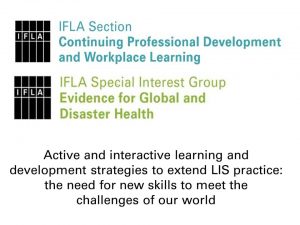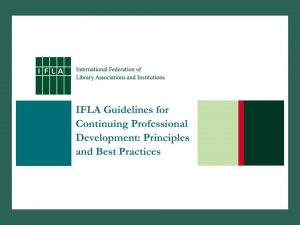The CPDWL Coaching Initiative is moving forward. A webinar was offered in the end of May “Enhancing your strengths through coaching”. This free webinar explored the role of coaching and its value for developing library and information professionals for the future. Further information on the webinar is available at: https://www.ifla.org/cpdwl/projects
The next step is a session at the WLIC in Athens. A Drop in Coaching session is offered on Thursday August 29, 08:30 – 10:30 in Banqueting Hall. Session 251 in the WLIC programme.
The session offers career and professional development coaching for the individual and is an initiative from CPDWL in collaboration with the Management & Marketing section.
All WLIC delegates are welcome to join the coaching session.
The set up is a drop-in session where the participants can get coached in areas as Professional development and lifelong learning, Career planning, People management and leadership, Change management, Project management, Marketing as well as Work-life-balance.
The coaching will focus on one individual at a time. Each coaching interaction will last approximately 15-30 minutes. Please note that there can be a waiting time for a coach to be available. There will be a waiting area available in the room.
The focus of the coaching will be to help develop the individual’s career and professional development. The coach helps the individual to move from where one is to where one needs to go and wants to be. The coach will support the coached person to see ways and opportunities to move forward in his/her professional life. The focus will be on supporting the individual to lead herself/himself and for the individual to identify areas in need of development.
Societal trends are placing new demands on the library and information sector. To ensure that library professionals are prepared to adapt to these changes, it is imperative to be ‘learning organizations’ and continuously develop the staff. The IFLA Guidelines for CPD state: “The individual library and information professional is primarily responsible for pursuing ongoing learning that constantly improves knowledge and skills”.
The CPDWL section has during the last years been working with interactive and collaborative methods in order to increase the professional development and competence sharing in the work of the section as well as of IFLA. During former CPDWL satellite conferences, career and professional development coaching has been part of the program. At WLIC 2018 in Kuala Lumpur a coaching pilot test was performed. This was very well received by the delegates, and we are now offering a new coaching possibility during the WLIC in Athens.
The members of the Coaching Initiative working group for the 2019 programme are Catharina Isberg, Almuth Gastinger, Ewa Stenberg and Ulrike Lang from the CPDWL section, and Anya Feltreuter and Cindy Hill from the Management & Marketing section.
/Catharina Isberg

